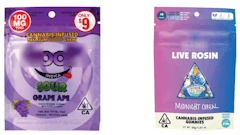
California’s adult-use cannabis dispensaries provided nearly $1.1 billion in state tax revenue in 2023, but the 6-year-old marketplace didn’t break any sales records.
The Golden State’s licensed retailers reported more than $5.1 billion in taxable sales in 2023, representing a 4.7% decrease from 2022, according to year-end data recently released by the California Department of Tax and Fee Administration (CDTFA).
This “taxable sales” figure, however, includes not only the sales of actual cannabis and cannabis products, but also the sales of tangible personal property, such as pipes, rolling papers, grinders and T-shirts, that licensed stores report on their tax returns.
It wasn’t until the start of 2023 that CDTFA began separately reporting actual cannabis sales that are subject to the state’s 15% excise tax from the taxable sales. Both categories are subject to the state’s normal sales tax, which ranges from 7.25% to 10.75% depending on the region.
In 2023, California’s adult-use dispensaries reported $4.4 billion in actual cannabis sales, which is more indicative of the marketplace as compared to other states. This figure represents roughly 85% of California’s all-inclusive taxable sales.
To some California stakeholders, this is notable as it relates to past assumptions that California had a $5.8-billion adult-use retail market in 2021, when in fact the actual sales total for cannabis was much lower.
And now with the California Department of Cannabis Control (DCC), the state’s head regulatory agency, releasing its own data dashboard on Feb. 21 for sales figures reported in the state’s track-and-trace system, Metrc, there’s a more clear picture on past years.
Specifically, California’s adult-use consumers spent just more than $4.8 billion at licensed dispensaries in 2021, according to the DCC, which is about $1 billion less than what many presumed based on CDTFA’s taxable sales figure.
California dispensaries also reported $540 million in medical cannabis sales to patients and caregivers in 2021, according to the DCC. But CDTFA’s figures have never included this population of consumers.
“Previous data provided by the CDTFA had indicated that California generated $5.8 billion in legal sales in 2021. This helped create a public narrative that California was a ‘$6-billion market,’” Hirsh Jain, founder of industry consultancy Ananda Strategy, told Cannabis Business Times. “But the recently released DCC monthly sales summary reports make clear that California generated only $5.35 billion in [total adult-use and medical] sales in 2021, and that legal sales have been in steady decline in California in the years since.”
California’s overall cannabis sales declined 8.4% to $4.9 billion in 2022—including $4.54 billion in adult-use and $360 million in medical cannabis sales—according to the DCC.
And while the DCC only has sales data updated through June 2023, the $2.41 billion in overall sales reported for the first half of 2023 is about 3% shy of the what dispensaries reported in the first half of 2022.
The falling sales numbers are directly correlated to falling retail prices, which peaked at an average of $35.23 per eighth ounce of flower in Q3 2020, but since have dipped more than $32% to $23.80 per eighth in Q2 2023 (roughly $6.70 per gram).
On the supply side, California’s licensed cultivators harvested a record 40.6 million plants in 2021—up 61% from the previous year—before dipping 16% to 34 million plants in 2022, according to DCC.
While the total cannabis sales figure for California’s first six years of an adult-use marketplace remains unknown—the DCC dashboards only includes data back to 2020, and CDTFA only has “taxable sales” for the first five years of the program—the industry has provided nearly $5.8 billion in total state tax revenue since the beginning of 2018, according to CDTFA.
Today, 62% of Californians say that adult-use legalization has had a positive impact on their state—more than the 57% of voters who supported Proposition 64 in the November 2016 election—and 86% of Californians who consume cannabis believe it’s important to shop at licensed stores, according to a DCC-commissioned survey.

























